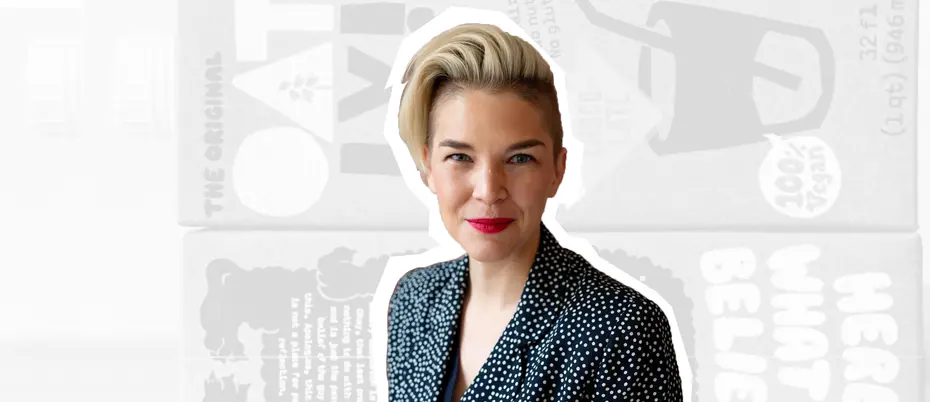Leadership
Oatly exec: How to lead with purpose in an imperfect world
Purpose-led work isn’t black-and-white. Practicing bravery and self-care, and tapping into creativity, can help leaders navigate the gray areas.
With a resume that boasts names like Chan, Zuckerberg, and Bacardi and companies like Google, Nike, and Lululemon, Heidi Hackemer has experienced a broad gamut of approaches to organizational purpose.
What she’s learned is this: Purpose is not black-and-white.
“There is no company that is operating at scale that is operating ‘purpose perfect.’ Instead, all companies are imperfect and have a choice,” said Hackemer during her keynote speech at the 2023 MIT Sloan Retail Conference.
Hackemer is the executive director of Oatly Futures Lab, part of the Swedish dairy-alternative company Oatly. She joined the company in 2022, after a decade spent in advertising and brand strategy and a two-year break from corporate America, during which she lived out of her truck on a cross-country adventure.
It was on a hike in Wyoming, Hackemer said, that she realized the way to change the world was to get companies to change, and purpose was the right tool.
“In the world we live in today, it’s expensive to do right in the short term,” Hackemer said.
Instead, companies need to recognize that they are imperfect and make the choice to “get smart, get creative, get brave, and try to create the momentum towards a radically better future.”
Here’s a closer look at those choices.
Get smart
Just because you’re not Greta Thunberg, that doesn’t mean you, too, can’t change the world.
If you want a clearer picture of your “realm of influence,” draw a map, Hackemer suggested. Start with your name in the middle of a piece of paper. Surround your name with the teams, people, and places you interact with. Connect those names and places to yourself with lines, and make those lines thicker “where you really can have an effect,” Hackemer said.
“This is how you start thinking about making change,” Hackemer said. “These are the connections where you can show up with ideas, energy, and solutions that align with the kind of work that you want to do. It doesn’t matter if you’re the most junior person on the team, the newest kid on the block, or the person with the least amount of experience at the table — you have influence. Get familiar with your influence, cultivate it, [and] use it for good.”
Get creative
Find a policy goal to get behind, and be creative in that support.
“A lot of the time, the big players are pressuring governments to keep the status quo in place,” Hackemer said. “But with focus, persistence, and creativity, the more radical players — big and small — can have a big impact in this space.”
Take Tony’s Chocolonely, a Dutch chocolate company that television and radio producer Teun van de Keuken founded after learning about forced labor in chocolate supply chains. Tony’s took out ads and collected signatures in favor of the European Parliament passing legislation to strengthen human rights and environmental protections in the production of commodities like wood, coffee, cattle, and cocoa.
“None of this is particularly expensive work, but it’s pointed and dogged, and it worked,” Hackemer said.
Get brave
Companies need courage if they’re going to work in a purpose-led space.
That’s because “you’re going to be bucking against systems of seemingly endless power. It means that people will call you crazy, unreasonable, naive, bothersome,” Hackemer said.
She offered electric motorcycle company Cake as an example. The company designs colorful, quiet electric bikes and invests in initiatives such as partnerships with conservation rangers in Africa. Cake has also set a goal to build a fossil fuel-free bike by 2025.
“In a category that is saturated in norms of aggression and masculinity, Cake is brave and purposeful in their own way,” Hackemer said.
One of Cake’s employees, Sinje Gottwald, recently completed a solo electric motorcycle trek from Barcelona to the tip of South Africa to demonstrate the bike’s abilities.
“How can you cultivate bravery in the decisions that you make? It might not be doing a solo ride through Africa or something similarly intense, but bravery is a muscle: Start small, and the strength of your bravery will develop,” Hackemer said.
Create momentum
In the process of solving the world’s biggest challenges, the siloed ways in which companies are organized and compete with one another can be transformed into collaboration, Hackemer said.
One example is the Accelerator 100+ program, led by Coca-Cola, AB InBev, Unilever, and Colgate-Palmolive. The companies — often competitors in their markets — have joined together to fund, mentor, and implement the outcomes from startups that are working to solve sustainability challenges, Hackemer said. Sometimes coalition members will adopt the same technology rather than keep innovation close to the chest as a competitive advantage, she said.
The challenge for people who want to lead with purpose begins with the question, “How can you cut through the traditional structures to get to the problem-solving?” Hackemer said. “How can you build unusual teams, coalitions and partnerships that can create momentum that you couldn’t build on your own?”
Read: 3 leaders detail practices that support stakeholder and societal values




